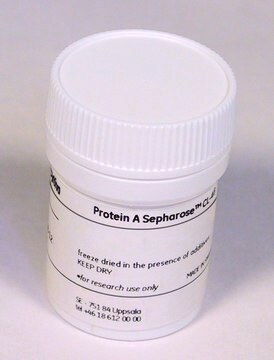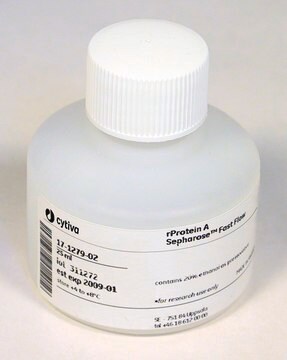P9424
ProteinA-Sepharose™ 4, Fast Flow from Staphylococcus aureus
aqueous ethanol suspension
Synonym(s):
Protein A–Agarose
About This Item
Recommended Products
biological source
Staphylococcus aureus
Quality Level
form
aqueous ethanol suspension
analyte chemical class(es)
proteins (Immunoglobulins of various mammalian species)
extent of labeling
~6 mg per mL
technique(s)
affinity chromatography: suitable
matrix
Sepharose 4B Fast Flow
matrix activation
cyanogen bromide
matrix attachment
amino
matrix spacer
1 atom
capacity
≥30 mg/mL binding capacity (human IgG)
storage temp.
2-8°C
Looking for similar products? Visit Product Comparison Guide
General description
Application
- in co-immunoprecipitation assay
- in immunodepletion
- to purify IgG from human serum and plasma
Physical form
Legal Information
Signal Word
Warning
Hazard Statements
Precautionary Statements
Hazard Classifications
Flam. Liq. 3
WGK
WGK 3
Certificates of Analysis (COA)
Search for Certificates of Analysis (COA) by entering the products Lot/Batch Number. Lot and Batch Numbers can be found on a product’s label following the words ‘Lot’ or ‘Batch’.
Already Own This Product?
Find documentation for the products that you have recently purchased in the Document Library.
Customers Also Viewed
Our team of scientists has experience in all areas of research including Life Science, Material Science, Chemical Synthesis, Chromatography, Analytical and many others.
Contact Technical Service












